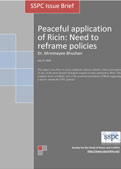Peaceful application of Ricin: Need to reframe policies

This paper is an effort to assess empirical evidence related to threat perception of one of the most dreaded biological weapon of mass destruction, Ricin. The evidence shows a realistic view to the notorious perception of Ricin, suggesting a need to reform the CWC policies!
Suggestions
Ricin should be removed from Schedule 1 and just like Botulinum toxin, with all declaration requirements, its commercial potential should be allowed to be exploited. The listing has so far only attracted negative attention to Ricin for bio-crime purposes, thereby putting tremendous pressure on civic administrations.
As summarized by Sonia Ben Ouagrham-Gormley, true barriers to bio-weapon development are not in restrictions for acquisition of biological materials, but the sustained development of the program resulting in weaponization. No single policy can curtail the BW proliferation threat, but considering the fragile nature of biomaterials, lessons learnt from the failures of non-state / state-funded BW programs should form the guiding principles to create higher barriers for future BW developments.
Once Ricin is removed from CWC Schedule 1, certain checks and balances may be enforced to create further barriers for use as a bio-weapon.
Suggested steps to be taken are:
- International controls, under CWC, over manufacturing units and periodic inspections
- Inspection and controls on entities that possess, use, or transfer select agents such as Ricin manufacturing labs, castor oil industry waste disposal, compliance for select agents on the lines of Botulinum toxin
- Lessons need to be learnt from challenge of counterfeit Botulinum toxin (BONTs)
- Providing guidance to regulated entities through the development of guidance documents, conducting workshops and webinars
- Investigation of any incidents in which non-compliance may have occurred